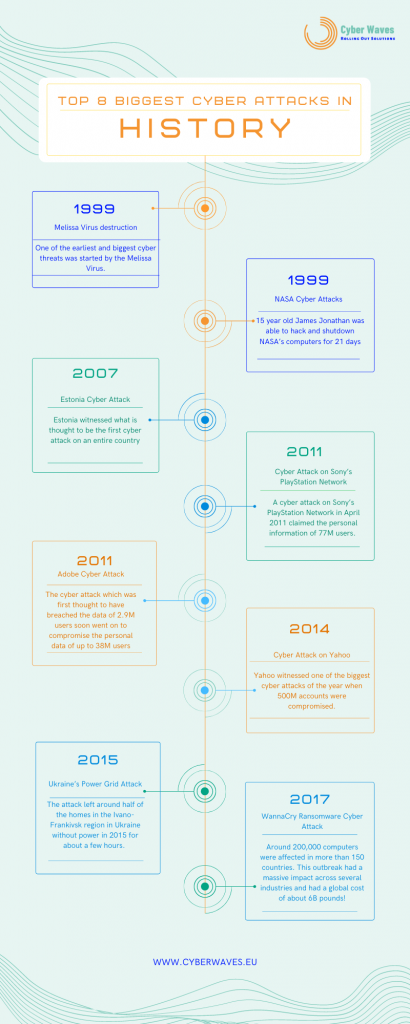Due to pandemic, cyberattacks are becoming common. The absence of a network perimeter in this new world accelerated the adoption of SASE (secure access service edge), zero trusts, and XDR (expanded identification and reaction) to guarantee remote clients and their information is ensured.
Keep reading to know more about cybersecurity in 2021. Cyber security experts predict there will be a cyberattack every 11 seconds, which is four times the rate of five years. Cyberattacks are not only increasing, the companies are also costing large financial losses.
History of Cyber Crimes
In the beginning 1970’s, the malicious link was the first document hacking when early computerized phones became the target. The techies called “ Pherakers”, who were the first hackers, discovered that the telephone system in America functioned on the basis of certain tones and tones that would result in free long distance service.
Top 8 Biggest Cyber Attacks in History
Common Types of Cyber Crimes
- Web attacks
- Malware
- Ransomware
- Password attacks
- Trojan Horse
- Insider threats
- Teardrop attacks
- Ping to the death attacks
- SQL injection
- AI powered attacks
- DDoS attacks
- PuP’s
- Eavesdropping Attacks
- Man in Middle attacks
- Drive by attacks
- Phishing attacks
- Spear phishing attacks
- Whale phishing attacks
- Cross Site scripting
- Brute force and Dictionary Network Attacks
- Cyberstalking
- Illegal/Prohibited content
Top Industries which affect in 2021
The industries most vulnerable to cyber attacks:
- Small businesses
- Healthcare institutions
- Government agencies
- Energy companies
- Higher education facilities
- Information and technology complained
- Maritime Industry
How to prevent cyber crimes in 2021?
“Precaution is better than cure.”
Prevention is more important in this case, so we are explaining the prevention of cyberattacks.
1. Common ways to prevent cyber attacks
- Install spam filter and anti-malware software
- Develop cybersecurity policies
- Implement cybersecurity awareness training
- Deploy next-generation firewalls
- Install Endpoint detection and response (EDR)
2. Advanced protection
- Perform A Successful Network Security Vulnerability Assessment
- Conduct Different Types Of Penetration Testing
- Create a data loss prevention program
- Implement SIEM (Security Information and event management) Solution
- Bring intrusion detection & prevent software (IDS and IPS)
We can help with prevention, mail us at tech@cyberwaves.eu
Next Articles: Maritime Technical Surveys: Problem VS Solutions
Author
Deepthi Bennan
Marketing Manager, Cyberwaves B.V.
